Related Research Articles
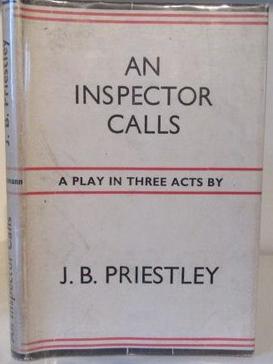
An Inspector Calls is a modern morality play written by English dramatist J. B. Priestley, first performed in the Soviet Union in 1945 and at the New Theatre in London the following year. It is one of Priestley's best-known works for the stage and is considered to be one of the classics of mid-20th century English theatre. The play's success and reputation were boosted by a successful revival by English director Stephen Daldry for the National Theatre in 1992 and a tour of the UK in 2011–2012.
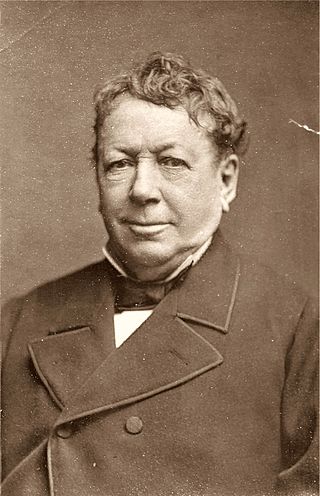
John Baldwin Buckstone was an English actor, playwright and comedian who wrote 150 plays, the first of which was produced in 1826.

Lucy Isabella Buckstone was an English actress born to a noted British stage family. She was perhaps best remembered for her portrayals of Annette in the Leopold David Lewis drama The Bells, and Lucy Ormond in Peril by Scott and Stephenson.

The Amen Corner is a three-act play by James Baldwin. It was Baldwin's first work for the stage following the success of his novel Go Tell It on the Mountain. The drama was first published in 1954, and inspired a short-lived 1983 Broadway musical adaptation with the slightly truncated title, Amen Corner. Anton Philips' production of The Amen Corner at The Tricycle Theatre in 1987 was the first black-produced and directed play to transfer to the West End of London. Phillips directed a revival of the play, again at The Tricycle, in 1999. The play was revived at the National Theatre in London in the summer of 2013.

The Private Secretary is an 1883 farce in three acts, by Charles Hawtrey. The play, adapted from a German original, depicts the vicissitudes of a mild young clergyman, innocently caught up in the machinations of two irresponsible young men who are bent on escaping their creditors.
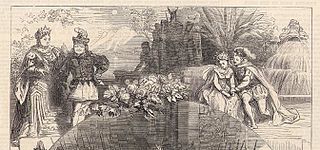
The Palace of Truth is a three-act blank verse "Fairy Comedy" by W. S. Gilbert first produced at the Haymarket Theatre in London on 19 November 1870, adapted in significant part from Madame de Genlis's fairy story, Le Palais de Vérite. The play ran for approximately 140 performances and then toured the British provinces and enjoyed various revivals even well into the 20th century. There was also a New York production in 1910.

John Ramsay Allardyce Nicoll was a British literary scholar and teacher.

Robert Keeley was an English actor-manager, comedian and female impersonator of the nineteenth century. In 1823 he originated the role of 'Fritz' in Presumption; or, the Fate of Frankenstein, the first known stage adaptation of Mary Shelley's novel Frankenstein.
The Haunted Inn is a 1828 melodrama by the British writer Richard Brinsley Peake. It was first acted at the Theatre Royal, Drury Lane and was part of a group of plays that used a country inn as a setting for sinister or threatening events.
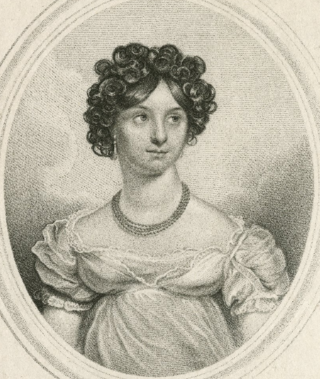
Henriette the Forsaken is an 1832 play by the British writer John Baldwin Buckstone. It premiered at the Adelphi Theatre in London's West End. Melodrama was in fashion at the time, and the play was a popular hit.
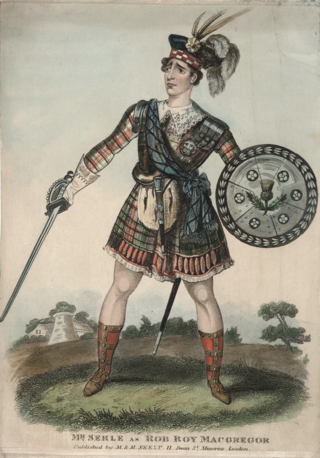
Thomas James Serle (1798–1889) was an English dramatist and actor. He was also a journalist with the Weekly Dispatch.
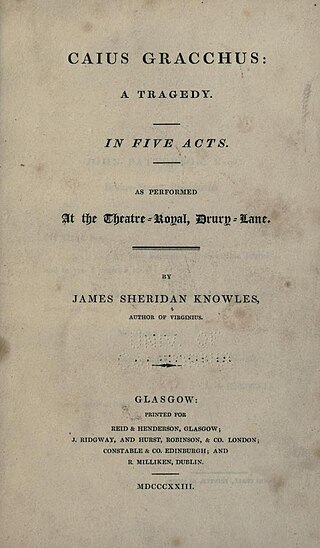
Caius Gracchus is a tragedy by the Irish playwright James Sheridan Knowles. It is based on the life of Gaius Gracchus, a politician in Ancient Rome. The play premiered at the Belfast Theatre in 1815 and enjoyed a good reception. It debuted in London's West End at the Theatre Royal, Drury Lane on 18 November 1823, following the success of the author's Virginius. The London cast included William Macready as Caius Gracchus, William Penley as Licinius, Alexander Pope as Drusus, Daniel Terry as Titus, Charles Mayne Young as Vettius, George Yarnold as Fulvius Flaccus, Thomas Archer as Opimius, Mrs. West as Licinia and Margaret Bunn as Cornelia.

Old Maids is an 1841 comedy play by the Irish writer James Sheridan Knowles. It was first staged at the Theatre Royal, Covent Garden in London on 12 October 1841. The cast included John Harley as John Blount, George Vandenhoff as Thomas Blount, Walter Lacy as Robert, Robert William Honner as Harris, William Payne as Stephen, Alfred Wigan as Jacob, Lucia Elizabeth Vestris as Lady Blance and Louisa Nisbett as Lady Anne. It was produced towards the end of the theatrical career of Sheridan Knowles, before he turned to novel-writing.
Look Before You Leap is an 1846 comedy play by the British writer George William Lovell. It premiered at the Theatre Royal, Haymarket in London's West End on 29 October 1846. The cast included Henry Howe as Brandon, John Baldwin Buckstone as Tom Tilly, William Farren as Mr. Oddington, Benjamin Nottingham Webster as Jack Spriggs, Julia Glover as Miss Brown, Priscilla Horton as Mary Oddington, Mrs Edwin Yarnold as Elinor Mortimer, Julia Bennett as Fanny Hardman.

The Three Strangers is an 1825 stage melodrama by the British writer Harriet Lee. It was based on one of her own works Kruitzner, co-written as part of The Canterbury Tales with her sister Sophia.

Julian is an 1823 historical tragedy by the British writer Mary Russell Mitford. It premiered at the Theatre Royal, Covent Garden on 15 March 1823. The original cast included William Macready as Julian, Maria Foote as Alphonso, King of Sicily, George John Bennett as Duke of Melfi, William Abbot as Count D'Alba, Daniel Egerton as Leanti, William Chapman as Calvi, Thomas Comer as Bertone and Maria Lacy as Annabel. Mitford wrote the play during the delays over the staging of her previous work Foscari which finally premiered in 1826. It is influenced by the 1820 rebellion on Sicily and its defeat and repression by Bourbon forces.

Foscari is an 1826 historical tragedy by the British writer Mary Russell Mitford. The plot revolves around Francesco Foscari, the son of the Doge of Venice, who is wrongly accused of murder and has to go into exile. It premiered at the Theatre Royal, Covent Garden on 4 November 1826. The original cast included Charles Mayne Young as Foscari, Doge of Venice, Charles Kemble as Francesco Foscari, James Prescott Warde as Count Erizzo, and Daniel Egerton as Donato.

Charles the First is a historical tragedy by the British writer Mary Russell Mitford. It depicts the imprisonment and trial of Charles I before his execution in 1649 following his defeat in the English Civil Wars. It was first written in 1825 and originally intended to be performed at Covent Garden. Mitford wrote the play with the encouragement of William Macready and Charles Kemble, the two leading performers at Covent Garden. However, the politically controversial top of regicide led to it being refused a licence by the Lord Chamberlain, the Duke of Montrose.

Strathmore is an 1849 historical tragedy by the British writer John Westland Marston. It premiered at the Theatre Royal, Haymarket in London on 20 June 1849. The original cast included Charles Kean as Halbert Strathmore, Henry Hughes as Sir Rupert Lorn, Henry Howe as Bycefield, John Baldwin Buckstone as Roland, Ellen Kean as Katharine Lorn and Fanny Fitzwilliam as Janet. It is set during The Killing Time amidst repression of the Scottish Covenanter religious movement in the seventeenth century.
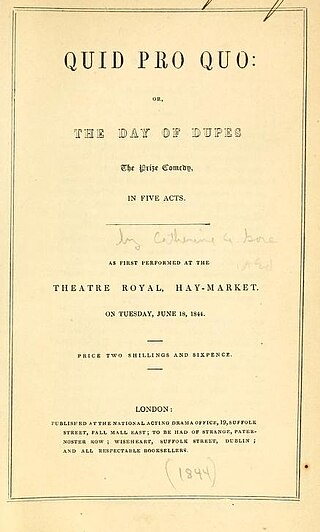
Quid Pro Quo is an 1844 comedy play by the British writer Catherine Gore, best known for her novels. It premiered at the Theatre Royal, Haymarket in London on 18 June 1844. The original cast included Louisa Cranstoun Nisbett as Lord Bellamont, Robert Strickland as Jeremy Grigson, John Buckstone as Captain Sippet, William Farren as Sir George Mordent, Henry Howe as Rivers, Julia Bennett as Lady Mary Rivers, Julia Glover as Mrs. Grigson, Mrs. Edwin Yarnold as Ellen and Anne Humby as Bridget Prim. The prologue was spoken by Benjamin Webster. The play was selected in a competition by a special committee led by Charles Kemble out of ninety six entries, for which Gore was rewarded with £500.